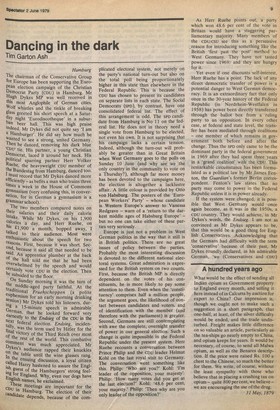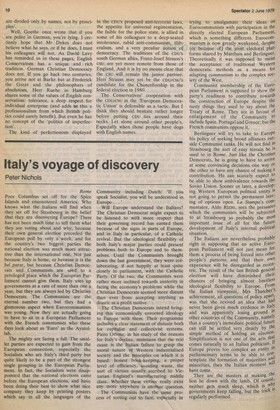Dancing in the dark
Tim Garton Ash
Hamburg The chairman of the Conservative Group for Europe has been supporting the European election campaign of the Christian Democrat Party (cm) in Hamburg. Mr Hugh Dykes MP was well received in this most Anglophile of German cities. Wolf whistles and the tinkle of breaking glass greeted his short speech at a Saturday night 'Eurodiscotheque' in a suburban beer hall. This was high praise Indeed. Mr Dykes did not quite say 'I am a Hamburger'. He did say how much he wanted to see a strong, united Germany. Then he danced, removing his dark blue 'CDU tie. His partner, a young Christian Democrat, laced it around her neck. His Political sparring partner Herr Volker Ruche, the heavyweight CDU member of the Bundestag from Hamburg, danced too. I must record that Mr Dykes danced more efficiently — as befits a man who trains three times a week in the House of Commons gYmnasium (very confusing this, in conversation, for in German a gymnasium is a grammar school). The two members compared notes on !heir salaries and their daily calorie intake. While Mr Dykes, on his 1,900 calories a day, and Herr Ruehe, on lus £1,900 a month, bopped away, I talked to their audience. Most were enthusiastic about the speech for two reasons. First, because it was short. Second, because it said all that needed to be said. An apprentice plumber at the back of the hall told me that he had been overwhelmed by the speech and would certainly vote CDU in the election. Then he subsided to the floor. On Sunday morning it was the turn of the middle-aged party faithful. At the traditional Fruehschoppen (a polite euphemism for an early morning drinking essl°11) Mr Dykes told his listeners, during a 15-minute speech in admirable German, that he looked forward very earnestly to the Endsieg of the CDU in the next federal election. Endsieg, inciden14,11Y, was the term used by Hitler for the Ilnal victory of the Third Reich over most of the rest of the world. This combative e_omment was much appreciated. Mr Dykes 's audience rapped their knuckles on the table until the wine glasses rang. In the ensuing discussion, a loyal citizen called Harry hastened to assure the English guest of the Hamburgers' strong feeling for England. Why, even our dogs have English names, he exclaimed. These meetings are important for the CDU .in Hamburg. The election of their Landidate depends, because of the corn plicated electoral system, not merely on the party's national turn-out but also on the total poll being proportionately higher in this state than elsewhere in the Federal Republic. This is because the CDU has chosen to present its candidates on separate lists in each state. The Social Democrats (sPD), by contrast, have one consolidated federal list. The effect of this arrangement is odd. The SPD candidate from Hamburg is No 11 on the federal list. He does not in theory need a single vote from Hamburg to be elected, not even his own. It is not surprising that his campaign lacks a certain tension. Indeed, although the turn-out will probably be greater than in Great Britain when West Germany goes to the polls on Sunday 10 June (and why are we the only country in the community to vote on a Thursday?), although far more money has been devoted to the campaigns here, the election is altogether a lacklustre affair. A little colour is provided by Otto von Habsburg. The posters of the 'European Workers' Party' — whose candidate is Western Europe's answer to Vanessa Redgrave — warn of a 'return to the darkest middle ages of Habsburg Europe' — but no one can take either of these parties very seriously.
Europe is just not a problem in West German politics in the way that it still is in British politics. There are no great issues of policy between the parties. Probably the most interesting discussion is devoted to the different national electoral systems. Great admiration is expressed for the British system on two counts. First, because the British MP is directly dependent on the votes of his constituents, he is more likely to pay some attention to them. Even when the 'constituency' comprises half a million people, the argument goes, the likelihood of contact between candidates and voters, and of identification with the member (and therefore with the parliament) is greater. Second, Germans are still contemplating with awe the complete, overnight transfer of power in our general election. Such a change is quite impossible in the Federal Republic under the present system. Herr Ruehe recounts a conversation between Prince Philip and the CDU leader Helmut Kohl on the last royal visit to Germany. The conversation went something like this. Phillip: 'Who are you?' Kohl: 'I'm leader of the opposition, your majesty'. Philip: 'How many votes did you get at the last election?' Kohl: '48.6 per cent, your majesty.' Philip: 'Then why are you only leader of the opposition?' As Herr Ruehe points out, a party which won 48.6 per cent of the vote in Britain would have a staggering parliamentary majority. Many members of the CDU/CSU see this as a persuasive reason for introducing something like the British 'first past the post' method to West Germany. They have not tasted power since 1969: and they are hungry for it.
Yet even if one discounts self-interest, Herr Ruehe has a point. The lack of any direct democratic transfer of power is a potential danger to West German democracy. It is an extraordinary fact that only once in the 30-year history of the Federal Republic (in Nordrhein-Westfalen in 1958) has power been directly transferred through the ballot box from a ruling party to an opposition. In every other case, at federal and state level, the transfer has been mediated through coalitions — one member of which remains in government both before and after the change. Thus the SPD only came to be the dominant party in the federal government in 1969 after they had spent three years in a 'grand coalition' with the CDU. This remarkable circumstance has been formulated as a political law by Mr James Fenton, the Guardian's former Berlin correspondent. Fenton's law states that no party may come to power in the Federal Republic unless it is in power already.
If the system were changed, it is possible that West Germany would once again become, as it was in the 1950s, a CDU country. They would achieve, in Mr Dykes's words, the Endsieg. I am not as convinced as Mr Dykes appears to be, that this would be a good thing for English Conservatives. Acknowledging that the Germans had difficulty with the term 'conservative' because of their past, Mr Dykes roundly declared, in his admirable German, 'we (Conservatives and cipti) are divided only by names, not by principles'.
Well, Goethe once wrote that if you are polite in German, you're lying. I certianly hope that Mr Dykes does not believe what he says, or if he does, I trust his colleagues will not. As David Levy has reminded us in these pages, English Conservatism has a unique and rich tradition. German Christian Democracy does not. If you go back two centuries, you arrive not at Burke but at Frederick the Great and the philosophers of absolutism. Herr Ruehe in Hamburg shares some of the values of English conservatism: tolerance, a deep respect for individual enterprise (and adds to this a professionalism from which British politics could surely benefit). But even he has no concept of the 'politics of imperfection'.
The kind of perfectionism displayed in the cpu's proposed anti-terrorist laws, the appetite for universal regimentation, the faible for the police state, is allied in some of his colleagues to a deep-seated intolerance, rabid anti-communism, illiberalism, and a very peculiar notion of democracy. The traditions of the cpu's south German allies, Franz-Josef Strauss's csu, are yet more remote from those of England. And it is by no means clear that the csu will remain the junior partner. Herr Strauss may yet be the opuicsu's candidate for the Chancellorship in the federal election in 1980.
The Conservatives' cooperation with the CDU/CSU in the 'European Democratic Union' is defensible as a tactic. But I think they should hesitate rather longer before putting CDU ties around their necks. Let alone around other people's. Especially when those people have dogs with English names.







































 Previous page
Previous page